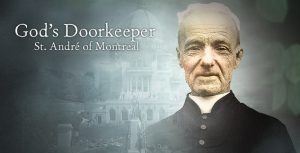HOMILY WEEKDAYS OF CHRISTMAS – JANUARY 7th
A God Who is Love, and Loving Like God:
Memorial of St André Bessette
(1 Jn 4:7-10; Ps 72; Mk 6:34-44)
********************************************
The readings today challenge us in two ways: how well do we really know God, and are we learning God’s language of love?
John in the first reading, and Mark in his gospel account, are clear: God is love, and we must learn the language of love – to love like God.
Megan McKenna, in her book on Advent, Christmas and Epiphany, recounts a simple, marvelous African story I will abbreviate thus:
A man in the Serengeti district of Marwa in Tanzania chose the name “Emmanuel” at baptism because he was fascinated with “God who is with us.” But he wondered what language God speaks, and was not satisfied by the answer of a local elder that God spoke their language of Kingoreme. He thought to himself, “When I get the right answer, I’ll know the truth by the joy in my heart,” and he set out to travel the world in pursuit of the answer. Everywhere he went people told him God spoke their own particular language: Kiswahili, Arabic, French, Cantonese, Dené, English, Spanish, Vietnamese, etc. As he arrived in Bethlehem in late December, he was informed God spoke Hebrew – it was God’s chosen language. Searching for a place to stay, he came upon a young couple and their newborn child and to his surprise was greeted with these words from Mary, “Welcome, Emmanuel, I know you have travelled far to learn the language God speaks. Your travels are over. God speaks the language of love, of welcome to the stranger, in every place. It is always understood.” Emmanuel was overjoyed to hear Mary’s words that rang true to his heart.
McKenna continues “Truly, God is with us today, in all those who learn God’s language – the welcome and oneness with those who are hungry, thirsty, naked, homeless, imprisoned, embittered, exiled, excluded, unwelcome. As the Beloved Disciple said to his community: we are either the disciples who have painstakingly learned the language of love, love unto death for all peoples or we lie and do not dwell with God, who dwells most clearly with those who most need love and welcome. We, like John the Baptizer, are not worthy to stoop and untie God’s sandal strap; but we, because of love, are worthy to stoop, welcome, and love all those in need. The whole world waits for us, the beloved children of God, to come.”
In his teaching, St. John provides us with a valuable example of “both/and” thinking that unites, versus the so often prevalent “either/or” thinking that tends to divide and polarize. There have always been two differing theologies within Christianity, which I would summarize as “atonement” on the one hand, and “revelation” on the other.
“Atonement” stresses the sinfulness of humanity and our need for salvation, strong among Protestants as evidenced by the catchy hymn, “He paid a debt he did not owe, I owed a debt I could not pay. I needed someone to take my sins away.” John acknowledges this viewpoint in the last line of today’s passage: “God … sent his Son to be the atoning sacrifice for our sins.”
What John does first, however, is stress the “revelatory” nature of Christ’s presence with the line, “God’s love was revealed among us in this way: God sent his only Son into the world so that we might live through him.” By his humble birth, life and ministry of selfless compassion, and especially by his death on the Cross, Jesus came above all to reveal to us the depth of the Father’s love. This theology is favored and espoused by the theologian Duns Scotus and Franciscans such as Richard Rohr.
The moment Jesus died on the cross, the gospel of Matthew (who is writing for a Jewish audience) points out the heavy curtain in the temple was “torn from top to bottom” (Mt 27:51). That is not a coincidence – it is a critical theological statement. That curtain was there to keep people away from the Holy of Holies where God was thought to dwell. Only the high priest could enter once a year on the Day of Atonement (fittingly) after he had purified himself enough. This smacks of the all-too-present human tendency towards Pelagianism, of making one’s self worthy to approach an otherwise aloof and unapproachable God. This has been the case in all sacrificial-based religions since time immemorial, as I witnessed in Petra, Jordan, when I climbed up to the High Place of Sacrifice of the Napateans.
The death of Jesus on the Cross changes this radically. There is no longer any separation between humanity and God. Now, for the first time ever, we can see into the heart of God, for Jesus has revealed God’s heart to us, and what we see is humility, gentleness, mercy, compassion, forgiveness, unconditional love and above all, total non-violence. Now we know who our God really is, love and only love. For St. John, it is “both/and” – both theologies are true, atonement and revelation, but I suspect atonement takes its deeper meaning from the underlying revelation of God as love.
The multiplication of the loaves in the gospel continues to reveal who God is in Jesus. That incident is not magic, nor is it just a miracle – it is a revelatory sign affirming both who Jesus is and how we are to respond. The compassion of God is evident as Jesus responds to the physical hunger of the crowd. That he could transform a few loaves and fish into enough food for five thousand people proclaims the divinity of Jesus. The disciples learn they have no need to go anywhere else to find food for the people, because they are in the presence of the One who is Bread of Life for the whole world.
The numbers involved add another poignant attribute to Mark’s gospel – subtlety. Mark communicates in a gentle, subtle way Jesus’ divinity: five loaves and two fish add up to seven, symbolizing perfection, wholeness, completion and infinity. It can also represent the gentile nations, the world: God is not a tribal God but a God who loves and redeems the whole world in Jesus. The twelve baskets full represent the twelve tribes of Israel, so Jesus is also the fulfillment of all the prophecies, hopes and desires of the Israelites. All they need do is to believe in him, and follow him.
Following Jesus, and learning the language of love, is at the heart of both readings. John insists we must “love one another” and “live through Christ” because God is love and has loved us first. For his part, Jesus first challenges the disciples, “You give them something to eat.” The lesson is clear – as his disciples, they will be charged to do what he does, to teach as he teaches, to love as he loves, to feed and nourish the world as he does. They too must learn not just who God in Jesus really is, but also learn God’s language of love, to love as Jesus loves. And so must we.
 Today the church honors someone who in his own simple way lived out the message of today’s liturgy, Saint André Bessette. Known to millions simply as Brother André, Alfred Bessette was born in St.-Grégoire, Quebec, in 1845. Orphaned by the age of 12, he was unschooled, small and sickly. In 1870 he joined the Congregation of the Holy Cross. For the next 40 years, he was porter at Collège Notre-Dame on Queen Mary Road in Montreal, where he excelled at hospitality. In the course of his duties, he welcomed the sick and afflicted, and it was his habit to pray with them through the intercession of Saint Joseph. He gained a reputation throughout the city and, as he was credited with extraordinary favours and with healings, more and more people came to the college to seek out the ‘Miracle Man of Montreal’.
Today the church honors someone who in his own simple way lived out the message of today’s liturgy, Saint André Bessette. Known to millions simply as Brother André, Alfred Bessette was born in St.-Grégoire, Quebec, in 1845. Orphaned by the age of 12, he was unschooled, small and sickly. In 1870 he joined the Congregation of the Holy Cross. For the next 40 years, he was porter at Collège Notre-Dame on Queen Mary Road in Montreal, where he excelled at hospitality. In the course of his duties, he welcomed the sick and afflicted, and it was his habit to pray with them through the intercession of Saint Joseph. He gained a reputation throughout the city and, as he was credited with extraordinary favours and with healings, more and more people came to the college to seek out the ‘Miracle Man of Montreal’.

St Joseph’s Oratory
Possessed of a deep love for Saint Joseph, Brother André erected a statue of the saint on the mountain across from the college. Then, assisted by lay friends in 1904, he built a wooden chapel on the mountain. Ove the years, the chapel grew into a basilica. Today, Saint Joseph’s Oratory welcomes more than two million visitors each year. Its founder lived to be 91, was declared blessed in 1982, and canonized on October 17, 2010. Saint André Bessette is the patron of family caregivers in Canada.
Jesus as Emmanuel is not only among us, but gives us all the gifts we need to be his loving presence in the world. The greatest gift he gave us is the Eucharist, his very presence through both Word and Sacrament.
May our celebration today deepen our experience of God’s love for us, and empower us to take that love out to the whole world as we speak God’s language of love by loving as God has loved us.




We are to love one another as we love ourselves and speaking God’s language towards other people who have not recognize God yet. When we are evangelizing or spreading the Good News out to the entire world always have compassion that comes from our hearts. It is a beautiful homily and message about loving this God or speaking God’s love because he is humble, merciful, having forgiveness, loving unconditionally towards us. He is always forgiving and love us for who we are no matter how many times we have sinned against him . He taught us how to love our neighbour and love ourselves. We are to love our enemies because we forgave them ; treating them with respect and dignity. We can give them a second chance to start over . It is like renewing our baptism by believing and trusting this one true God or Trinitarian God. Let us spread the Good News out to communities with many love and compassion. Amen. Thanks be to God.
Thanks Bishop Sylvain Lavoie for all well written homilies and teachings. It is pretty clear what all reflections are saying about Jesus Christ. May God Bless you. ❤️❤️❤️????????????